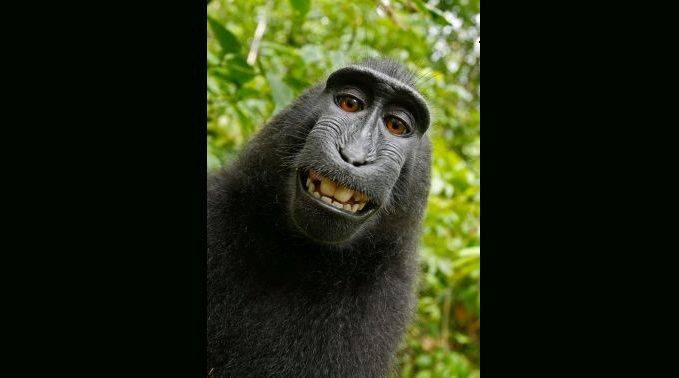First there was the selfie and then came the Monkey Selfie. Who can forget the series of selfies taken by the six-year-old crested macaque Naruto, who was singlehandedly responsible for the selfie evolution. A place which evens the selfie stick couldn’t take. To jog you memory, here is a brief back ground- English photographer David John Slater, on a trip to the Indonesian National Park, had left his camera without any supervision. The camera landed in the hands of Naruto, the macaque, resulting in what could only be called a selfie phenomenon.
The photographer subsequently went on to publish a book, for commercial use, containing the Monkey Selfies. The issue first arose when one of the images ended up on Wikimedia Commons, which has a policy of only publishing public domain works or works permitted to be distributed under the Creative Commons license. According to them, the Monkey Selfie was very much a work in the public domain. Mr. Slater sent them a takedown notice alleging his copyright claim over the image. However, Wikimedia refused to take down the image, resulting in a suit lost by Mr. Slater.
Now, the Monkey Selfie is back and this time it’s PETA (meaning People for Ethical Treatment of Animals and not People Eating Tasty Animals) suing Mr. Slater, claiming that the author of the selfie is Naturo and that “Naruto should be afforded the protection of a claim of ownership, and the right to recover damages and other relief for copyright infringement”. According to the plaint PETA states that the selfies were a result of the “purposeful and voluntary actions” by Naruto, without any external supervision, therefore the original work should be rightfully owned by Naruto and not Slater.
PETA’s logic, clearly stated in the plaint, is that if the photo was taken by a human he would be allowed to claim authorship over the photograph and be entitled to all benefits from the copyright in it. They further assert that “under the Copyright Act, 17 U.S.C. § 101 et seq., is sufficiently broad so as to permit the protections of the law to extend to any original work, including those created by Naruto”. Adding to the foregoing, PETA added that all the proceeds from the sale, licensing or any other commercial use of the Monkey Selfies should be used for the benefit of Naruto, his family, his community and for the betterment of his surroundings.
Going by the US law the only requirement to claim ownership over a work, is that there should be an author. However, for all practical purposes such author should be human. Section 202.02(b) of the Compendium II of Copyright Office Practices further states that “The term “authorship” implies that, for a work to be copyrightable, it must owe its origin to a human being. Materials produced solely by nature, by plants, or by animals are not copyrightable.”
Now coming to the Indian law. The Indian Copyright Act, 1957 states that an author of a photograph is the ‘person’ taking the photograph. As far as the meaning of ‘person’ goes, Jurisprudentially the meaning includes a legal or natural person (meaning human). Further, Section 3 (39) of the General Clauses Act, 1897 says that the meaning of ‘person’ includes “company or association or body of individuals, whether incorporated or not.”
Even though there is recognition given to the fact that certain animals are intelligent ‘non-human person’, as stated by the Ministry of Environment and Forests about Dolphins, this statement cannot be exaggerated. Animals are treated as persons in certain cases, but this is purely to protect them.
Considering the aforementioned, it is safe to say that our monkey friend probably will not find solace anytime soon.
Authored by Anchita Sharma



